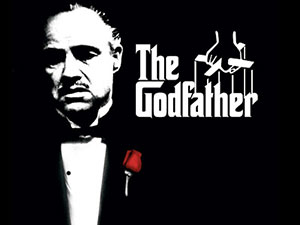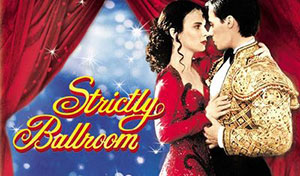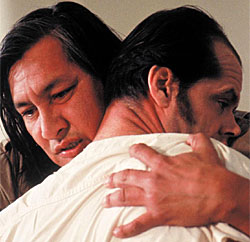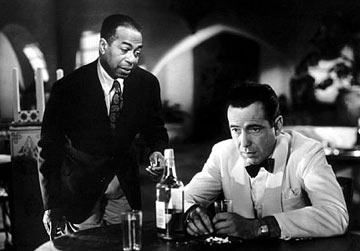
In my last post, I talked about a special sort of story that can vault the Hollywood-Indie divide. Here I identify five characteristics of the Transcendent Story that can touch both broad audiences and tough critics.
1st quality of Transcendent Story: Eternal
A good story can be specific and temporal – purely of the times. But, the great story will typically have to it a dimension that lifts it beyond its particular characters and situation, making it universal and eternal – a story for all of us, for all time.
What am I talking about?
Here’s an example. If you had a film about a sheep dog that wanted to win a sheep dog trial, you could have a reasonably engaging story. But if it’s just about winning or losing this competition then its power is likely to be limited.
However, if you had a film about a pig that wanted to win a sheep dog trial, then you have something else entirely. Suddenly the story – which on the surface is about farmyard animals – has something to say to all of us about the importance of not submitting to how other people perceive us and of fighting to break down those superficial and unjust limitations. It’s Rosa Parks. It’s Billy Elliot. It’s Emmeline Pankhurst. It’s Elephant Man. It’s Harvey Milk. It’s Boys Don’t Cry. And, of course, it’s Babe.

Babe and one of his unlikely charges – the gallant pig’s unwillingness to be bound by his appearance gave this Australian film a transcendence that allowed it to succeed internationally.
This is the other meaning for “transcendent” that I alluded to earlier. Having a meaning or significance beyond the immediate or the particular. A transcendent story takes us past the primal and physical to touch the spiritual and the eternal.
How do you give your story this timeless, soaring quality?
2nd quality of Transcendent Story: Metaphysical
Life is hard. That’s why we need stories – to help us deal with that. But the challenges we face as humans come in a range of different flavours, as Maslow noted.
We have some very fundamental needs: food, shelter and to not be eaten by wild animals. A lot of the great cathartic stories deal with these very primal sort of challenges. Jaws. Alien. Deliverance.
But these are problems that our lower order, reptilian brain was equipped to deal with. One of the things that makes life both richer but more perplexing is that our brains have evolved to recognise and grapple with much more difficult concerns – the realm of the metaphysical.
Don’t get put off by that term.
“Metaphysics” just means questions for which there are no clear, definitive answers, questions that lie beyond the physical and the observable, like …
- Is there a God?
- If so, why do bad things happen to good people?
- If not, where do I turn for guidance?
- Does life have meaning?
- Can I give it meaning?
- What does it mean to be a good human being?
- What is love?
- Who should I love?
- Does everything happen for a reason?
- Is my life fated?
- If so, why try?
- Is life worth living?
Some will remonstrate that there are definitive answers to these questions. But the fact is that, whatever you might hold in your heart to be true, there is no way of proving whatever you might believe. The answers to these questions are unknown and unknowable. And that makes them really tricky.
And, it’s why films that address these issues – if they do it well – will engage us more completely, because it means the story isn’t dealing with the more superficial concerns that for most in the developed world are no longer our primary focus, but instead it’s engaging with the deeper, more troubling, though potentially more fulfilling dimensions of being human.

Strictly Ballroom isn’t about winning a dancing competition – it’s about having the courage to move to your own beat, and this transcendent quality catapulted Baz Luhrmann onto the world stage.
So, another quality of the Transcendent Story, I would say, is that it deals with a big metaphysical question.
It’s a Wonderful Life explores a man contemplating suicide because he feels that his life is worthless since he never left his small town and did all the things he dreamed of doing.
Stars Wars and Strictly Ballroom explore the area of Free Will and Determinism – will we submit to our actions being controlled by others, or break free of those shackles and follow our hearts?
Brokeback Mountain examines what happens when you meet the love of your life but it doesn’t come packaged quite as you expected. Do you resist in the hope that a more convenient option comes along, or grasp what might be your one shot at the grand prize?
The fact that the Transcendent Story deals with these big, difficult questions leads to the next characteristic …
3rd quality of Transcendent Story: Dilemma
If you’re in the desert and you have no water – then you have a problem.
But the protagonists in Transcendent Stories tend to be dealing with something bigger than a problem. They’ll very often ultimately be confronted with a dilemma.
What’s the difference?
If you can’t pay the rent, you have a problem.
But if you can’t pay the rent and your landlord offers to overlook it if you sleep with him, you have dilemma.
If you hanker for a guy who loves someone else, you have a problem.
But if you hanker for a guy who loves your best friend and you know your best friend is having an affair, you have a dilemma.
And, if someone wants to kill you, you have a problem.
But if someone wants to kill you and you have chance to escape but it would mean never seeing your three-year-old son again, you have a dilemma.
The Transcendent Story, then, has the protagonist solving not just a problem as they might in a cathartic story, but has them caught in a pincer movement that leaves them with a very difficult choice.
This choice can often involve a three-way battle between your primal, lower-order reptilian brain, your more touchy-feely mammalian brain, and your-do-what’s-right, higher order cerebral cortex.
Drawing on Freud’s terms for these three elements of the modern mind, Bruno Bettelheim elegantly described the conundrum that exists at the heart of the great stories:
“Myths typically involve superego demands in conflict with id-motivated action, and with the self-preserving desires of the ego.”
Not that I would suggest that 40 Year Old Virgin is an example of a Transcendent Story – though there are elements of it that I love dearly – but it does help illustrate Bettelheim’s point.
The dilemma facing Andy (Steve Carell) is this:
• His Id wants sex.
• His Ego fears rejection if he gives into the demands of his id.
• And his Superego makes him question sex in the absence of love.
A dilemma asks you to choose between what your basic instincts tell you do to do, and what your moral soul demands of you. Often it’s about the choice that’s good for you, and the choice that’s for the greater good.
In Casablanca, Rick is torn between heart and duty.
In The Godfather, Michael must choose between family and morality.
In Schindler’s list, Oskar can leave with suitcases full of money or use it and risk his life to try to save his Jewish workers.
And, that brings us back to what Campbell was saying about spiritual instruction and the next quality of the Transcendent Story.
4th quality of Transcendent Story: Wisdom
Because life is difficult and we find ourselves grappling with these big questions, and facing these impossible dilemmas, we need help. We need wise counsel. And the Transcendent Story will artfully supply it.
As Campbell said: “(Myths) are about the wisdom of life, they really are”.
As David Puttnam said, “If movies were what they might be, there’d be no need to go to church”.
And as the American philosopher Kenneth Burke said, “Stories are equipment for living”.
The great films offer enduring observations about how we might more fruitfully lead our lives.

In The Lives of Others, Wiesler comes to question whether an ideology that is notionally of the people is really for the people.
The Lives of Others warns us to be wary of any ideology that forgets its humanity.
Eternal Sunshine reminds us that pain is not the end of love, but possibly the beginning.
Lars and the Real Girl tells us that when we insulate ourselves from the ache of heartbreak, we deny ourselves the ineffable joy of a deep and abiding love.
Of course, the challenge is for your story to convey this wisdom through the action of its drama rather than the dialogue of its characters. This is one of my beefs with a lot of indie cinema. In the absence of dramatic structure, they are reduced to making literal their take on the human condition. It’s not engaging and it’s not persuasive.
But if you can remind us of an eternal truth through the authentic struggles of an identifiable protagonist, possibly without ever verbalising your heartfelt belief, your film can take flight and enter the storytelling Hall of Fame.
But for that, we’ll need one more thing …
5th quality of Transcendent Story: Profoundly moving
Of all the qualities I’ve identified, I consider this the most important. You might hold a different set of values. Fair enough. But, for me, the ability to profoundly move a significant number of people is the characteristic of the Transcendent Story I place above all others.

The ending of One Flew Over the Cuckoo’s Nest is one of the most moving in cinema and has the exquisitely painful sort of quality I call “Ecstatic Agony”.
I believe it’s vital because for all this talk of soaring, it’s also important that there’s a dimension to the story that remains grounded – rooted in the common, collective experience. Demanding that a film profoundly moves us, regardless of whatever other lofty recommendations you might make about it, stops us from disappearing up our metaphysical orifices.
Lots of indie films deal with the unknowable, aspire to the eternal and believe they have something important to say about the human condition but they often fail to move us in the way I think that we as human beings are craving to be moved. And if you don’t profoundly move us, there are consequences.
If your film works only at the cerebral and not at the emotional level, you might be lauded by the cineastes but you’ll leave behind the broader audience. Perhaps this doesn’t matter to you. OK. But, I object to the idea that a film is somehow more worthy because it attracts a small audience rather than a large one. It could be that it’s a work of such philosophical and aesthetic genius that it demands a rare and refined palate, or it might just mean that it’s missing something elemental. More often, I fear, it’s the latter.
But forget the size of the audience. It’s the effect on the audience that concerns me more. Because I think if a story is to make us feel “the rapture of being alive”, it must move us in the most extraordinary way.
So when I say “moves”, I’m not talking about getting slightly teary when boy gets girl at the end of a run-of-the-mill romantic comedy. Or crying over a dead dog.
I am talking about it moving every fibre of your being.
Like you are at the end of Dead Poets Society. Or The Lives of Others. Or One Flew Over the Cuckoo’s Nest.
And to do that to your audience, a common-or-garden happy ending won’t cut it. And neither will an ending that is merely sad. You will need to strike a chord that reaches deep down in our souls, and to do that you’ll need to reach a place I call, “Ecstatic Agony”. What’s Ecstatic Agony? In my next post I’ll explain all.
When is my next 2-day screenwriting course?
Please add me to the Cracking Yarns mailing list
Other posts you might like to read:
What’s better than a happy ending or wee pie? Ecstatic Agony
How to win audiences and Oscars – introducing the Transcendent Story
Radical Solution to the Hollywood-Indie standoff – Character and Story in the same screenplay
